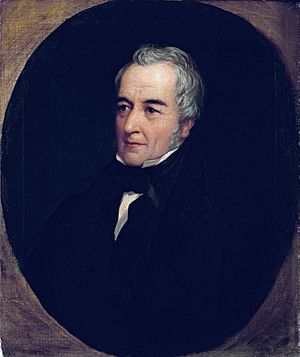Edward Hawke Locker facts for kids
Edward Hawke Locker (born October 9, 1777, in East Malling, Kent – died October 16, 1849, in Iver, Buckinghamshire) was an English artist who painted with watercolours. His art can still be seen in famous places like the V&A and British Museum. He also worked as an important manager at the Royal Naval Hospital, Greenwich.
A Life of Travel and Art
Edward Hawke Locker was the youngest son of William Locker, a naval captain. He was named after his father's friend, Admiral Edward Hawke.
He started working for the navy in 1795 as a clerk. Later, he became a special assistant, or "civil secretary," to Admiral Edward Pellew. This job took him on many travels between 1804 and 1814. He visited places like the East Indies, the North Sea, and the Mediterranean.
In 1802, Edward had an exciting adventure. He went on a hot-air balloon ride in England with a French balloonist named André-Jacques Garnerin. This happened during a time of peace between England and France.
He also traveled to Spain in 1813 during the Peninsular War. He delivered important messages to Wellington, a famous general. In 1814, he even visited Napoleon when Napoleon was living in exile on the island of Elba.
Family and Work at Greenwich
In 1815, Edward married Eleanor Mary Elizabeth Boucher. Her father had once been a friend of George Washington. Edward and Eleanor had several children. Their sons included Frederick Locker-Lampson, who became a poet, and Arthur Locker, who became a writer and journalist.
The family lived in Windsor for a few years, then moved to Greenwich in 1819. Edward began working at the Royal Naval Hospital, Greenwich. This hospital cared for sailors. He became the secretary in 1819 and then a civil commissioner in 1824.
Edward worked hard to make the hospital better. He helped add new roads using ideas from John Loudon McAdam. He also made a big dream come true for his father. In 1824, he started a Naval Gallery inside the hospital's Painted Hall. King George IV gave 31 paintings to start this collection. This gallery later became the beginning of the famous National Maritime Museum.
Edward was also one of the people who helped start the Athenaeum Club, a famous club in London. In 1844, he had to retire from his work at the hospital due to health reasons. He moved to Iver, where he passed away five years later.
His Published Work
Edward Hawke Locker also published a book of his art:
- Views of Spain, 1824 – This book featured illustrations based on his own beautiful watercolour paintings.
Sources
 | Emma Amos |
 | Edward Mitchell Bannister |
 | Larry D. Alexander |
 | Ernie Barnes |


